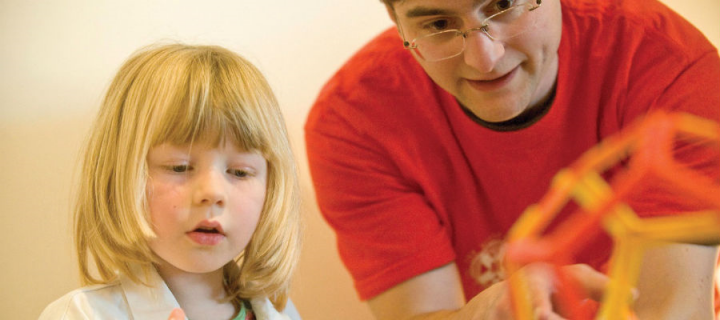Science Festival Interview with Dr Janet Paterson
Dr Janet Paterson of the University's School of Biological Sciences organises the University's activities for families at the Edinburgh International Science Festival.
The programme, which takes place at the National Museum of Scotland throughout the festival, featured drop-in events, workshops and shows designed to engage and delight a family audience.
What were people coming along to the family activities able to experience?
Visitors of all ages were be able to get hands-on with a wide range of free drop-in activities, workshops and shows across many areas of research in the University, from chemistry to medical science.

Are there any activities in this year's family programme that you were especially excited about?
I was really impressed by Lost in Space, an auditorium show that was a fantastic immersive experience with giant projections of the universe and specially composed music. Drop-in activities from our roboticists and biologists were popular too. Also, ‘Children and Technology’, a drop-in activity from the School of Education, allowed visitors to try out technology for children, and share their thoughts on the impact of this - directly contributing to research. The ‘DNA, Dolly and You’ workshop for children was also very timely with this being the 20th anniversary of the birth of Dolly the sheep. Sorry, there are too many to mention!
What do you hope audiences have got out of coming along?
I hope that people were inspired and enthused about science, understand why scientific research is important, and see that scientists can be very approachable and communicative! One of the things that visitors tell us every year is that they love being able to speak to scientists. Taking part in activities alongside students and staff who work in the relevant areas of science provides a valuable level of engagement. As a University, this is something that we can provide.
How do activity demonstrators or volunteers benefit from taking part?
Every year, visitors have good things to say about the knowledge and approachability of our student volunteers. These are mainly postgraduate research students, and it’s a great opportunity for them to hone their communication skills and have the chance to tell people about what they do and why they’re doing it. For researchers, having to explain their work is a great way for them to step back, look at the big picture, and asking themselves why it matters. Equally valuable is hearing visitors’ thoughts on this research, and it’s of benefit to the volunteers to have this two-way interaction.
Why is it important that the University takes part in family events at the science festival?
Having a good relationship with the local community is extremely important to the University, and taking part in the Edinburgh International Science Festival is one way that we can interact with the public and hopefully provide an engaging and positive experience for them. It also strengthens our long-standing and valuable relationship with our partners, the National Museum of Scotland, and of course it’s wonderful to be part of such a fantastic festival.
What impact does your work have on society?
Engaging the public with scientific research is important and necessary. People want scientists to be accountable and open, and events such as this provide a great opportunity for scientists to do this.
How does managing these events challenge you or your colleagues?
Organisation of the family activities at the festival occurs all year round, with more than 200 staff and students involved in the final programme, and with activities from many different disciplines. Many staff take part on a voluntary basis, fitting their participation around their research. It’s a big logistical challenge, but one that’s very much worth the time and effort.
What is the best thing about overseeing the University's family programme for the festival?
The best thing is seeing everything up and running after months of organisation, and watching visitors and scientists engaging with each other naturally.

